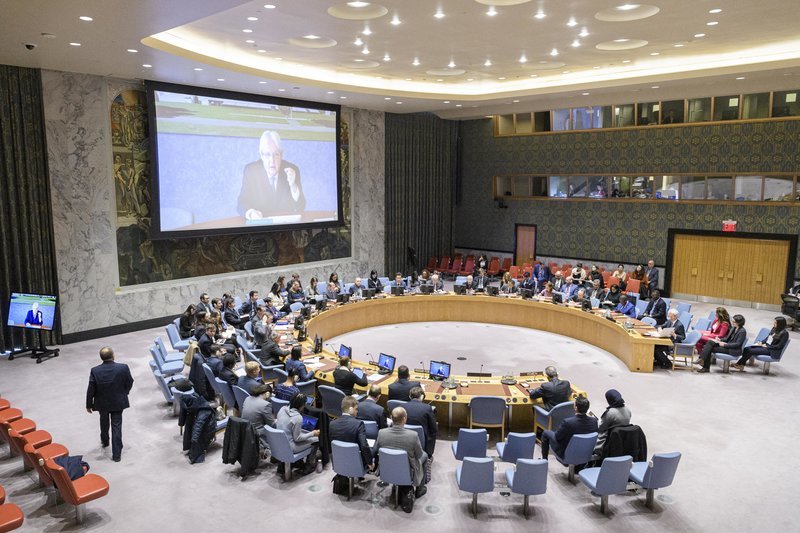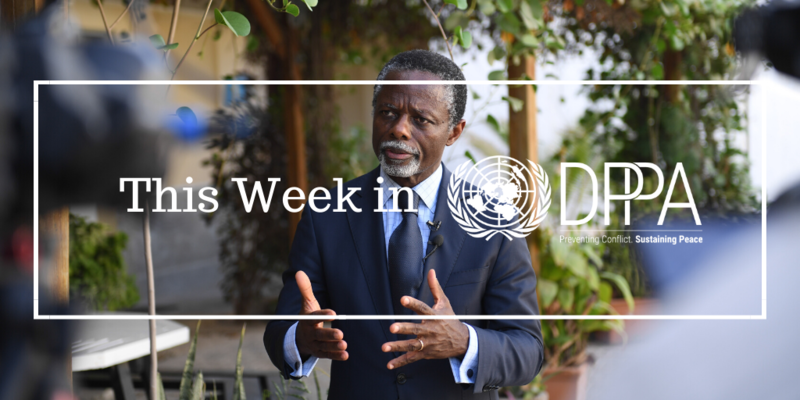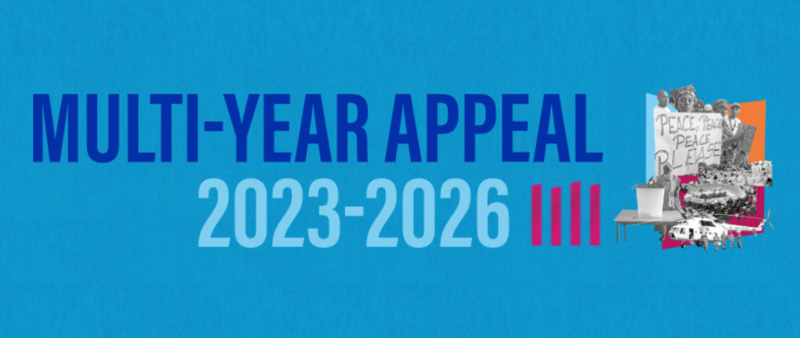Security Council
Peace in Yemen cannot be taken for granted
Yemen Envoy Martin Griffiths briefed the UN Security Council on 18 February. He warned about an escalation in fighting between the parties and told Council members that he was distressed by “reports of the dozens and possibly hundreds of civilian casualties, displacement of families and damage to schools and hospitals.“ “The parties have reassured me many times of their belief in a peaceful, political solution to this conflict,” he said. “But peace cannot be taken for granted. It requires continuous commitment and the nurturing of a political process to make it happen. The escalation…directly contradicts the parties’ desire to move in that direction.”
Read his full remarks here
Read more in UN News
Ceasefire violations in Ukraine deeply concerning
Under-Secretary-General Rosemary DiCarlo updated the Council on the situation Eastern Ukraine on 18 February. " Today’s disturbing reports of major ceasefire violations across the contact line near Zolote, including alleged use of heavy weapons, are deeply disturbing and a stark reminder that in the absence of sustained political will, there is a very real risk of backsliding and further violence," Ms. DiCarlo said. "This conflict continues to exact an unacceptable humanitarian toll on the Ukrainian population, " the Under-Secretary-General concluded.
Read her full remarks here
Read more in UN News
Critical situation in northwestern Syria
Syria Envoy Geir O. Pedersen briefed the Council on 19 February, highlighting the situation in and around Idlib. "I appeal once again for full respect for international humanitarian law and for an immediate ceasefire in Idlib, ultimately towards a nationwide ceasefire,” Mr. Pedersen said. The rapidly deteriorating situation in northwestern Syria was the backdrop for the briefing. More than 900,000 people being displaced since December due to an ongoing military offensive. “I urge all members of this Council to put their weight firmly behind the search for a political way forward,” he told Council members.
Read his full remarks here
Read more in UN News
La Lime: “Haitian leaders need to rise to the occasion“
Helen La Lime, Special Representative and Head of BINUH, briefed the Council on 20 February. “Haiti is about to enter in its second year with a caretaker government, its economy is forecast to sink deeper into recession, and 4.6 million of its citizens are now estimated to require humanitarian assistance,” Ms. La Lime said. “To avoid a greater deterioration, Haitian leaders need to rise to the occasion and commit to a way out of this impasse that will best serve the interests of their people.”
Read the latest report of the Secretary-General on the work of BINUH here
Watch the briefing here
New York
C-24 kicks off its 2020 session
“Decolonization is one of the most significant chapters in the UN’s history,” said Secretary-General António Guterres at the opening of the latest session of the Special Committee on Decolonization (C-24) on 21 February. “In 1946,” he continued, “72 Territories were placed on the original list of Non-Self-Governing Territories. Today, this number stands at 17. We can all be proud of this achievement. We must not forget, however, that the peoples in those 17 Territories are still waiting for the promise of self-government to be fulfilled.” This year marks the final year of the Third International Decade for the Eradication of Colonialism.
or more information, visit: https://www.un.org/dppa/decolonization/en
Peacebuilding Commission discusses Central African Republic and review of peacebuilding architecture
The Peacebuilding Commission (PBC) met on 20 February to discuss the 2020 review of the peacebuilding architecture, focusing on effective support in UN transition contexts. Deputy Secretary-General Amina Mohammed, Deputy Joint Special Representative for the African Union-United Nations hybrid operation in Darfur (UNAMID) Anita Kokui Gbeho and Karin Landgren, Executive Director of the organization Security Council Report, briefed the Commission. Member States stressed that nationally-owned and field-driven peacebuilding is at the heart of effective transition processes. They emphasized the unique role of the PBC in bringing different UN actors together to ensure timely and effective system-wide support to national transition strategies.
On 19 February, the Chair of the PBC Central African Republic (CAR) Configuration, Permanent Representative of Morocco Omar Hilale, debriefed PBC members on his recent trips to Washington D.C. and to Bangui, CAR. Assistant Secretary-General for Africa Bintou Keita briefed on latest political developments and preparations for upcoming elections. Member States called for support to CAR authorities to help ensure inclusive implementation of the peace agreement, restoration of state authority, strengthening the rule of law and transitional justice, and protection of civilians. They also called for contributions to the UN Development Programme-managed electoral basket fund in support of timely and peaceful elections in the country.
|
|
Cyprus
Launch of gender sensitive socio-economic impact assessment of a settlement to the Cyprus issue
The UN Office of the Special Adviser to the Secretary-General on Cyprus (OSASG), together with the World Bank, launched a gender sensitive socio-economic impact assessment of a settlement to the Cyprus issue on 17 February. “The assessment concludes that a comprehensive settlement accompanied by appropriate gender responsive policies and institutions will be an opportunity for greater economic growth to the island that can benefit women and men in both communities,” Elizabeth Spehar, Deputy to the Secretary-General’s Special Adviser on Cyprus and Head of UNFICYP, said.
Read more on OSASG’s website
Colombia
Massieu: It is a priority to continue working for the security of communities and ex-combatants
The commitment of the national and local authorities, the FARC and the community to address the security and protection situation in the Santa Lucía Reintegration Area was one of the areas highlighted by the Special Representative and Head of the UN Verification Mission in Colombia, Carlos Ruiz Massieu, during his statement at the Inter-institutional Coordination Table for the Stabilization and Consolidation and Security of FARC Ex-Combatants, held on 19 February in the north of Antioquia, Colombia. "I want to reiterate the need to continue working for the security of the communities and the ex-combatants, both those who leave and those who stay in the Reintegration Area of Santa Lucía, Ituango," said Ruiz Massieu. The event, organized by the Presidential Advisor for Stabilization and Consolidation Emilio Archila, was attended by members of the public force, the Director of the Special Investigation Unit of the Prosecutor's Office, Martha Mancera; the Deputy Ombudsman, Jorge Calero; the Director of the Reintegration and Normalization Agency, Andrés Stapper; the Peace Delegate of the Government of Antioquia, Rafael Blanco; officials of the Protection Unit, local authorities, FARC members, and the local community.
For more information, contact us
Lebanon
Special Coordinator visits Egypt
Ján Kubiš, Special Coordinator for Lebanon, visited the Egyptian capital Cairo on 18 February. He held meetings with the Secretary-General of the League of Arab States Ahmad Aboul Gheit and Egyptian Foreign Minister Sameh Shoukry. Both meetings focused on the current situation in Lebanon and the broader region.
Read more on UNSCOL’s website
Somalia
Public consultations on new constitution
A three-day public consultation meeting, held as part of Somalia's constitutional review process, ended in Baidoa in Somalia’s South West State on 19 February. More than 100 people attended the meeting, organized by the federal Ministry of Constitutional Affairs (MoCA), with the support of the United Nations Assistance Mission in Somalia (UNSOM). Participants exchanged views on issues pertinent to power- and resource-sharing, federalism, elections, the justice system and national security.
Read more on UNSOM’s website
Uganda
Special Envoy visits Uganda
Huang Xia, Special Envoy for the Great Lakes, met with President Yoweri Museveni of Uganda at the State House in Entebbe on 18 February. They discussed strategies to further boost development and cooperation among the countries of the Great Lakes region.
For more information, contact us
|










